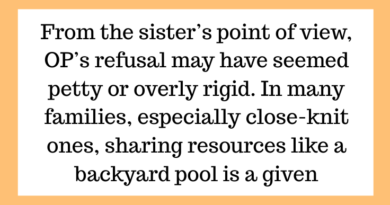AITAH for Not Paying for My Girlfriend’s Portion of the Vacation I Didn’t Want to Go On?
Vacations are supposed to be relaxing, right? But what happens when a trip you didn’t even want turns into a financial guilt trip? In today’s AITAH-inspired dilemma, a boyfriend is accused of being stingy and unsupportive—all because he didn’t foot the bill for something he never agreed to in the first place.
Let’s unpack this heated situation and find out who’s really in the wrong.
The Situation: A Vacation You Never Asked For

Our story comes from a 27-year-old man—let’s call him Rohan—who’s been dating his girlfriend, Anika, for about two years. Anika has always dreamed of visiting Bali, and she brought up the idea of going there for her birthday with Rohan.
Rohan wasn’t excited. He had been swamped with work, was already saving for a new car, and preferred staycations or less expensive trips. Still, he said he’d think about it.
Weeks passed. Anika kept mentioning the trip, even dropping links to villas and excursions. Eventually, she went ahead and booked a romantic package for two—flights, hotel, activities, everything.
She then sent him the invoice, assuming they’d split the cost 50/50.
Rohan was stunned. He reminded her he never agreed to the trip. She insisted that “of course” he was going—after all, they’re a couple, and it’s her birthday. He refused to pay.
That’s when things blew up.
The Argument: Love, Money, and Miscommunication

Anika accused Rohan of being selfish and inconsiderate. She said any “real” boyfriend would happily pay for half—or all—of a birthday vacation for his partner. She claimed he was emotionally distant and always “ruining things” when it mattered most.
Rohan, on the other hand, felt blindsided. He never gave the green light. He felt Anika made a unilateral decision and expected him to fund it. He offered to celebrate her birthday in a simpler, more affordable way—but she called that “cheap and lazy.”
Feeling conflicted and frustrated, Rohan turned to Reddit’s r/AITAH community to ask: Am I the villain for not paying for a vacation I never agreed to?
The Debate: Entitlement or Emotional Neglect?

Team Rohan: Respect Boundaries, Especially Financial Ones
Rohan’s defenders pointed out a key truth: relationships are partnerships, not obligations. Just because you’re dating someone doesn’t mean you owe them financial support for plans you never agreed to.
Commenters noted that booking a trip without clear consent is a red flag—especially when money is tight or one person is saving for something important. Love doesn’t require blind spending.
Many argued that Rohan did nothing wrong by saying “no,” and that it’s okay to not want—or be able—to split an expensive trip you didn’t help plan.
Team Anika: Romance Requires Effort
Supporters of Anika’s side saw things differently. Some felt Rohan’s reluctance reflected a lack of enthusiasm for the relationship itself.
“It’s her birthday,” one user said. “If you can’t celebrate that with her in a way she dreams of, what’s the point?”
Others emphasized that relationships involve occasional sacrifices, and while booking the trip without confirmation wasn’t ideal, maybe Anika assumed Rohan’s silence meant tacit approval.
Communication Breakdown: Where It Went Wrong

This situation wasn’t just about the trip—it was about communication.
Anika assumed a level of commitment and financial support that Rohan didn’t offer. Rohan avoided clearly saying “no,” possibly to spare her feelings or avoid conflict. The result? Misunderstanding, resentment, and a hefty invoice.
In any partnership, especially romantic ones, clarity around money and mutual expectations is critical. If one person feels entitled and the other feels cornered, it’s a recipe for conflict.
The Bigger Picture: Financial Consent Is a Real Thing

This isn’t just a one-off fight between a couple. It highlights a recurring issue in many relationships: financial boundaries.
Here’s what both parties—and all couples—can take away:
-
Consent applies to finances too. If one person is spending with the expectation of shared costs, that expectation needs mutual agreement.
-
Silence isn’t consent. If you’re not on board, say it clearly. Mixed signals lead to mixed emotions.
-
Gifts should never be invoices. Surprises are only sweet when they don’t come with an obligation.
How Could This Have Been Handled Better?

Rohan Could Have:
-
Communicated his hesitation clearly and early.
-
Suggested a firm alternative before the trip was booked.
-
Reiterated his financial goals so they were understood.
Anika Could Have:
-
Confirmed before booking instead of assuming.
-
Respected his budget and priorities.
-
Viewed his unwillingness as circumstantial, not personal.
So, AITAH?

According to the majority on Reddit: Rohan is not the villain.
He didn’t agree to the trip. He didn’t book it. He never gave false hope. While his communication could have been more direct, financial autonomy matters—and no one should be guilt-tripped into paying for something they never said yes to.
That said, both partners have some learning to do about communication, expectations, and emotional maturity.



